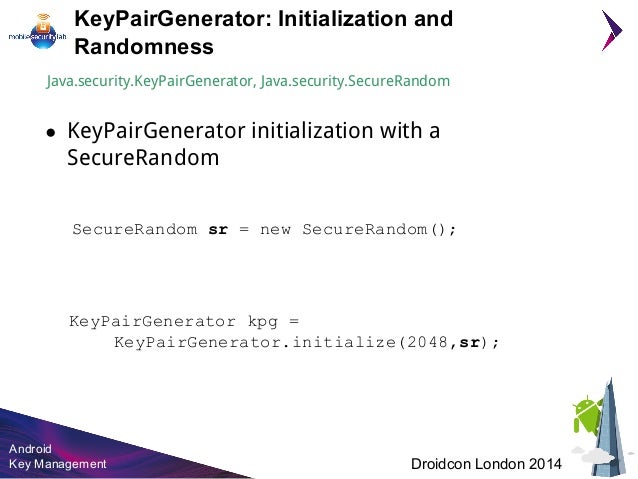Random Key Generator In Java
Key generators are constructed using one of the getInstance class methods of this class.
Dragon age awakening cd key generator. KeyGenerator objects are reusable, i.e., after a key has been generated, the same KeyGenerator object can be re-used to generate further keys.
- Generate Public and Private Keys. The keysize for a DSA key generator is the key length (in bits), which you will set to 1024. The source of randomness must be an instance of the SecureRandom class that provides a cryptographically strong random number generator (RNG).
- This class provides the functionality of a secret (symmetric) key generator. Key generators are constructed using one of the getInstance class methods of this class. KeyGenerator objects are reusable, i.e., after a key has been generated, the same KeyGenerator object can be re-used to generate.
The keysize for a DSA key generator is the key length (in bits), which you will set to 1024. The source of randomness must be an instance of the SecureRandom class that provides a cryptographically strong random number generator (RNG).
There are two ways to generate a key: in an algorithm-independent manner, and in an algorithm-specific manner. The only difference between the two is the initialization of the object:
- Algorithm-Independent Initialization
All key generators share the concepts of a keysize and a source of randomness. There is an
initmethod in this KeyGenerator class that takes these two universally shared types of arguments. There is also one that takes just akeysize/microsoft-office-2010-license-key-generator.html. argument, and uses the SecureRandom implementation of the highest-priority installed provider as the source of randomness (or a system-provided source of randomness if none of the installed providers supply a SecureRandom implementation), and one that takes just a source of randomness.Since no other parameters are specified when you call the above algorithm-independent
initmethods, it is up to the provider what to do about the algorithm-specific parameters (if any) to be associated with each of the keys. - Algorithm-Specific Initialization
For situations where a set of algorithm-specific parameters already exists, there are two
initmethods that have anAlgorithmParameterSpecargument. One also has aSecureRandomargument, while the other uses the SecureRandom implementation of the highest-priority installed provider as the source of randomness (or a system-provided source of randomness if none of the installed providers supply a SecureRandom implementation).
In case the client does not explicitly initialize the KeyGenerator (via a call to an init method), each provider must supply (and document) a default initialization. See the Keysize Restriction sections of the JDK Providers document for information on the KeyGenerator defaults used by JDK providers. However, note that defaults may vary across different providers. Additionally, the default value for a provider may change in a future version. Therefore, it is recommended to explicitly initialize the KeyGenerator instead of relying on provider-specific defaults.
Every implementation of the Java platform is required to support the following standard KeyGenerator algorithms with the keysizes in parentheses:
AES(128)DES(56)DESede(168)HmacSHA1HmacSHA256
- Java Cryptography Tutorial
- Message Digest and MAC
- Keys and Key Store
- Generating Keys
- Digital Signature
- Cipher Text
- Java Cryptography Resources
- Selected Reading
Java provides KeyGenerator class this class is used to generate secret keys and objects of this class are reusable.
To generate keys using the KeyGenerator class follow the steps given below.
Step 1: Create a KeyGenerator object
The KeyGenerator class provides getInstance() method which accepts a String variable representing the required key-generating algorithm and returns a KeyGenerator object that generates secret keys.
Create KeyGenerator object using the getInstance() method as shown below.
Step 2: Create SecureRandom object
The SecureRandom class of the java.Security package provides a strong random number generator which is used to generate random numbers in Java. Mp3tag for mac free download. Instantiate this class as shown below.
Random Key Generator In Java Software
Step 3: Initialize the KeyGenerator

The KeyGenerator class provides a method named init() this method accepts the SecureRandom object and initializes the current KeyGenerator.
Initialize the KeyGenerator object created in the previous step using the init() method.
Example
Random Key Generator Music

Following example demonstrates the key generation of the secret key using the KeyGenerator class of the javax.crypto package.
Output
Random Key Generator In Java Pdf
The above program generates the following output −